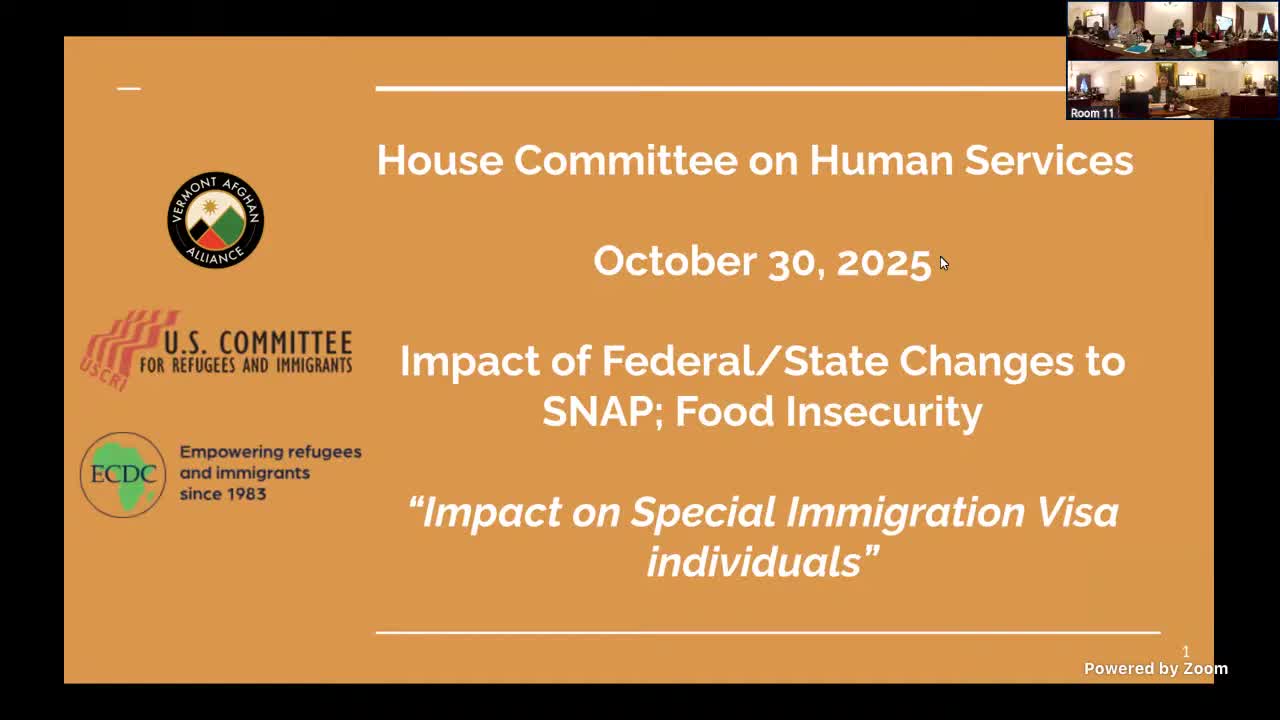Legislators urge Vermont to restore food aid for Afghan SIV holders after Oct. 1 SNAP change
Get AI-powered insights, summaries, and transcripts
Subscribe
Summary
Vermont lawmakers and refugee resettlement organizations pressed state officials on Nov. 1 after the state implemented federal SNAP changes that removed benefits for many recently arrived noncitizens, including some Afghan special immigrant visa holders, leaving families without food assistance.
Vermont lawmakers and refugee resettlement agencies pressed state officials on Nov. 1 over the sudden loss of Supplemental Nutrition Assistance Program (SNAP) benefits for some Afghan arrivals after the state implemented federal changes on Oct. 1.
Molly Gray, executive director of the Vermont Afghan Alliance, told the committee Vermont has resettled roughly "650 Afghans" and argued that special immigrant visa (SIV) holders should retain SNAP eligibility because H.R.1 amended the Food and Nutrition Act of 2008 but — she said — earlier statutes and guidance treat SIV holders like refugees. "As soon as someone becomes a lawful permanent resident...they are eligible for SNAP benefits," Gray said, urging the state to reinstate benefits and provide back pay to Oct. 1.
Sonali Samal Singh, field office director for USCRI Vermont, described families who lost benefits on Oct. 1 and offered agency counts the state can use for outreach. USCRI identified 46 "highly vulnerable" households and estimated about 150 individuals abruptly lost all or part of their SNAP benefits; Sonali said the loss harms food security and access to culturally specific groceries and can hinder job‑readiness and integration. "SNAP is not a luxury. It's a lifeline," she said.
Joe Wu, executive director of the Ethiopian Community Development Council (ECDC), read a case study of an Afghan widow who arrived in September and was denied food assistance because of the state action. "Special immigrant visa holders are not ordinary immigrants," Wu said. He urged creation of an alternative emergency program and immediate relief for those who served U.S. missions overseas.
Tracy Dolan, director of the State Refugee Office in the Agency of Human Services, presented state arrival estimates and explained the administration’s legal rationale. Dolan said H.R.1 removed refugees from SNAP eligibility, that the state found no statutory exemption applicable to SIV holders from the five‑year lawful‑permanent‑resident waiting period under PRWORA, and that the department was concerned about the federal payment‑error rate. "The law says that they're entitled to the same benefits as refugees, and H.R.1 says refugees have been removed from having eligibility," Dolan told the committee as she described the department’s reading.
Administration officials said $106,000 in existing state refugee‑office funds would be repurposed as a short‑term "off‑ramp" to help the most impacted households while agencies perform vulnerability assessments and distribute aid. Officials described the distribution as a temporary cushioning measure and said agencies (USCRI, ECDC) would identify households most in need.
Legislative counsel and committee members noted there are divergent interpretations among states and advocacy groups and that the U.S. Department of Agriculture has not issued binding implementation guidance since H.R.1 took effect. Counsel said states face uncertain risk to their SNAP payment‑error rate whether they continue or cut benefits without federal guidance. Representative Emily Garifano moved that the committee recommend the Department for Children and Families reinstate SNAP benefits for Afghan SIV holders or use state funds to provide food assistance pending USDA guidance; the motion was seconded and carried as a nonbinding committee recommendation with some abstentions.
The committee asked the administration to provide data on how many Afghan arrivals currently receive SNAP and to continue outreach with resettlement agencies. Witnesses urged rapid action while the federal picture remains unsettled and pressed the state to publicly affirm support for resettled Afghans who worked with U.S. missions.
Next steps discussed included distributing the $106,000 off‑ramp funds to the most vulnerable households, tracking federal guidance and payment‑error guidance from USDA, and preparing follow‑up briefings to the committee on how the state will reconcile legal interpretation with humanitarian and workforce goals.
